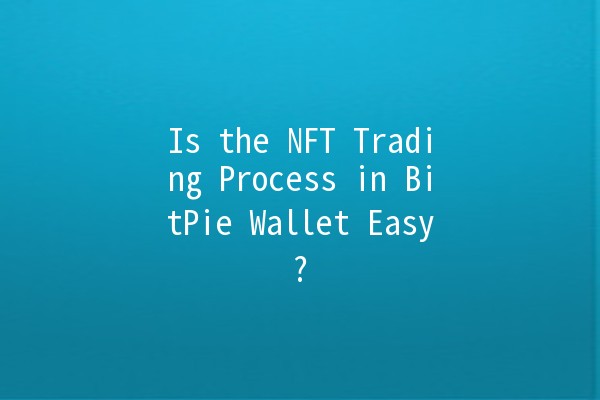
In recent years, NonFungible Tokens (NFTs) have revolutionized the digital asset space. While the excitement around NFTs is palpable, the platforms that facilitate these transactions can vary greatly in complexity. One such platform is the BitPie Wallet, which claims to offer a straightforward NFT trading experience. In this article, we will explore the NFT trading process in BitPie Wallet to understand how simple it truly is.
Understanding NFT and Its Importance
NonFungible Tokens (NFTs) are unique digital assets that represent ownership of specific items or content, often linked to art, music, sports collectibles, or even virtual real estate. Unlike cryptocurrencies such as Bitcoin or Ethereum, NFTs cannot be exchanged on a onetoone basis due to their uniqueness.
Why are NFTs Important?
With this understanding, let's dive into the NFT trading process specifically within the BitPie Wallet.

Getting Started with BitPie Wallet
Before trading NFTs, you need to have a BitPie Wallet set up. Here’s a stepbystep overview:
Platforms: Available for both Android and iOS.
Installation Process: Go to your app store, search for "BitPie," and install the app.
Registration: Upon opening the app for the first time, you will need to create an account using your email.
Security Features: Set up twofactor authentication (2FA) for added security.
The BitPie Wallet interface is designed to be userfriendly. You can easily navigate to different features, including the NFT marketplace and your asset holdings.
Understanding the NFT Trading Process on BitPie Wallet
Now, let’s break down the trading process stepbystep to assess its simplicity.
Step 1: Fund Your Wallet
To buy NFTs, you need to deposit funds into your BitPie Wallet. This can be done via:
Cryptocurrency Transfer: Send cryptocurrencies like BTC or ETH from another wallet.
Exchange Purchase: Buy cryptocurrencies on an exchange and then transfer them to your BitPie Wallet.
Step 2: Accessing the NFT Marketplace
Once your funds are available, you can navigate to the NFT section of the wallet where you’ll find various NFT listings.
Filters and Search: Use filters to search for specific NFTs or browse categories.
Step 3: Buying NFTs
Step 4: Selling Your NFTs
When you want to sell your NFT:
Step 5: Completing Transactions
Once your NFT is sold, the transaction is finalized, and the funds will be deposited into your wallet.
Five Productivity Tips for Navigating NFT Transactions
While the trading process in BitPie Wallet is relatively straightforward, enhancing your productivity can further streamline your NFT trading experience.
Tip 1: Set Alerts for NFT Deals
Description: Use the notification feature in BitPie Wallet to set alerts for specific NFTs or price drops.
Example: If you’re eyeing a particular NFT, set an alert for its price. This way, you’re always informed of deals without constantly checking.
Tip 2: Use a Secure Internet Connection
Description: Always use a secure and private WiFi connection when accessing your wallet.
Example: Avoid public WiFi; instead, use a personal hotspot or secured network to ensure your assets remain safe.
Tip 3: Research NFTs Before Purchase
Description: Conduct thorough research on NFT creators and projects.
Example: Look into the NFT’s background, creator reputation, and market trends to make informed purchasing decisions.
Tip 4: Organize Your NFTs
Description: Use folders or categories within your wallet to organize NFTs based on type, interest, or potential selling price.
Example: Create collections for art, music, or virtual real estate, making it easier to track and manage your assets.
Tip 5: Leverage Community Discussions
Description: Engage with NFT communities on platforms like Discord or Reddit to gain insights and tips.
Example: Join channels related to BitPie or specific NFT projects to share experiences and get advice from seasoned traders.
Common Questions about NFT Trading in BitPie Wallet
BitPie Wallet utilizes advanced encryption technologies and 2FA to safeguard users' assets. However, always follow best practices like using a secure connection and never sharing your wallet password.
Yes, many wallets and marketplaces support NFT trading, including MetaMask and OpenSea. However, BitPie Wallet offers a userfriendly interface specifically designed for easy transactions.
You can trade a wide range of NFTs, including digital art, music, domain names, and virtual items. Always ensure you’re familiar with the specific NFT's details before completing a transaction.
Yes, like most wallets, BitPie may charge transaction fees, especially when converting cryptocurrencies or when performing transfers. Always check the fee structure before making a transaction.
As of now, BitPie Wallet primarily functions as a marketplace for buying and selling NFTs. To mint your NFTs, you may need to use other platforms, such as OpenSea or Rarible, which allow you to create and mint items directly.
The time it takes for NFT transactions to process can vary based on network congestion and the blockchain used. Typically, transactions can take anywhere from a few minutes to several hours.
In summary, the NFT trading process in BitPie Wallet is designed to be straightforward and userfriendly. From funding your wallet to buying and selling NFTs, each step is intuitive. With the additional productivity tips provided, users can enhance their trading experience while ensuring safe and informed transactions.
As the NFT landscape continues to evolve, staying updated with market trends and community insights will be crucial for any successful trader. Whether you are a seasoned NFT enthusiast or just getting started, BitPie Wallet offers a solid platform to explore this exciting digital frontier.

